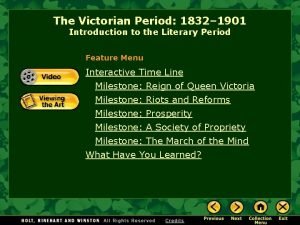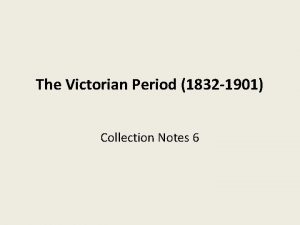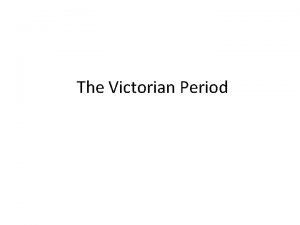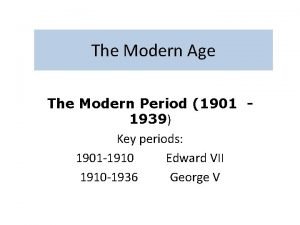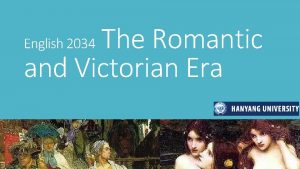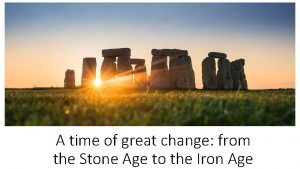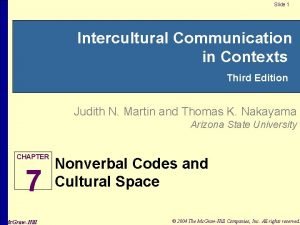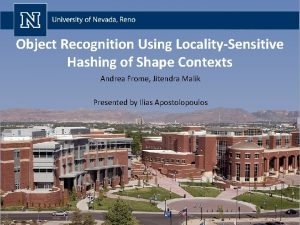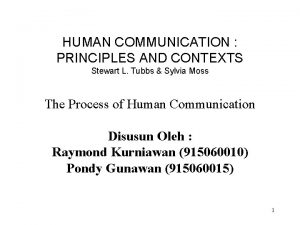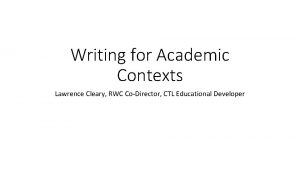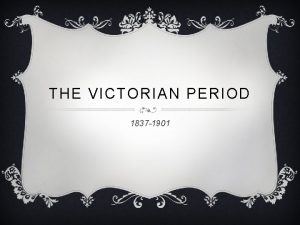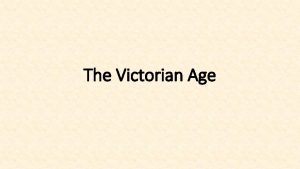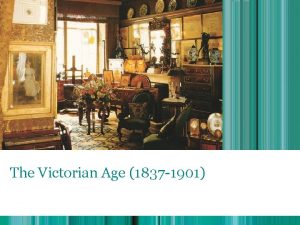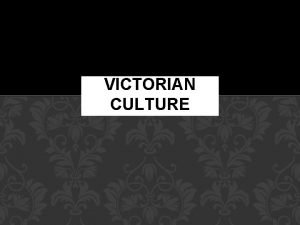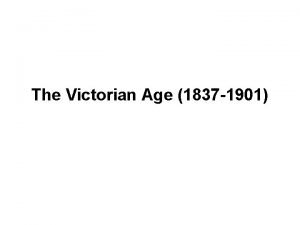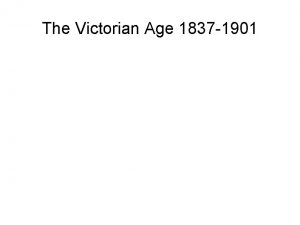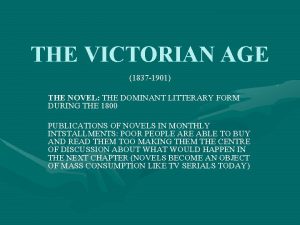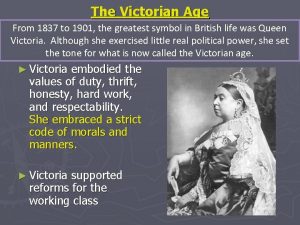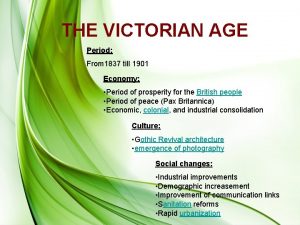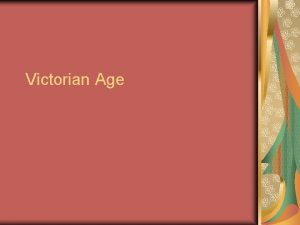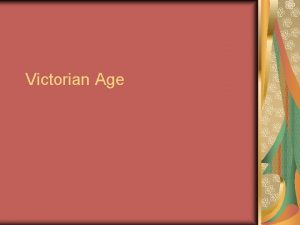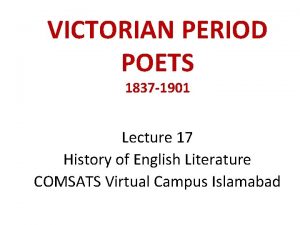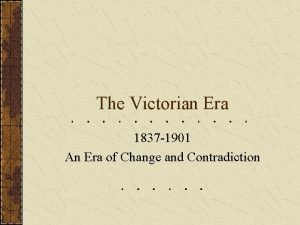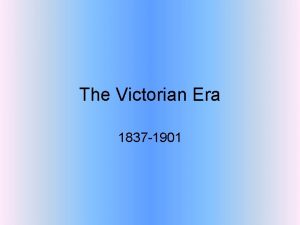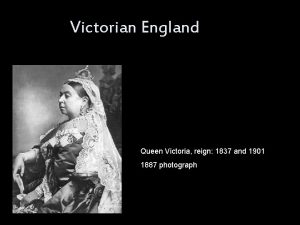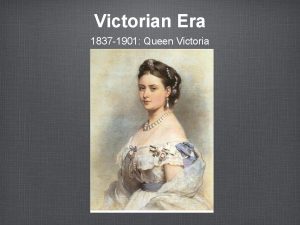The Victorian Age 1837 to 1901 Cultural Contexts


![General features “In the sixty years [from 1830 to 1890 …], Britain as a General features “In the sixty years [from 1830 to 1890 …], Britain as a](https://slidetodoc.com/presentation_image/fc031e128d3ad7d2b3eed1a7ce3108fa/image-3.jpg)




















![Evolution “It is clear […] from the whole scope of the natural laws, that Evolution “It is clear […] from the whole scope of the natural laws, that](https://slidetodoc.com/presentation_image/fc031e128d3ad7d2b3eed1a7ce3108fa/image-24.jpg)


![Charles Darwin – Natural Selection “[…] can we doubt (remembering that many more individuals Charles Darwin – Natural Selection “[…] can we doubt (remembering that many more individuals](https://slidetodoc.com/presentation_image/fc031e128d3ad7d2b3eed1a7ce3108fa/image-27.jpg)



- Slides: 30

The Victorian Age 1837 to 1901 Cultural Contexts

General features “It was the best of times, it was the worst of times, it was the epoch of belief, it was the epoch of incredulity” (Charles Dickens, A Tale of Two Cities [1859]) general shifts and changes: • development of an urban-industrial England • swift increase in population (from 9 mio. around 1800 to 32. 5 mio. by 1901) • steam navigation, telegraph (1830 s and ’ 40 s) rapidity of communication; photography, electrotyping new forms of representation and proliferation • social and political reforms • shift of authority from religion to science
![General features In the sixty years from 1830 to 1890 Britain as a General features “In the sixty years [from 1830 to 1890 …], Britain as a](https://slidetodoc.com/presentation_image/fc031e128d3ad7d2b3eed1a7ce3108fa/image-3.jpg)
General features “In the sixty years [from 1830 to 1890 …], Britain as a whole, and England more specifically, passed from being a predominantly rural and mercantile society, ruled by an aristocratic élite and a powerful Established Church, with a largely unofficial and only incipiently specialised intellectual life, to being a predominantly mercantile and industrial society, increasingly democratic and (within Christian bounds) religiously plural, whose intellectual life was fragemnting into the various specialisations we are familiar with today. The middle classes were the chief agents and beneficiaries of these unprecedented developments, the parvenus who transformed a ‘feudal’ society into a ‘modern’ state. ” (Robin Gilmour, The Victorian Period: The Intellectual and Cultural Context of English Literature 1830 -1890 [London: Longman, 1993] 3)

heterogeneity • early Victorian (1830 -1850); mid-Victorian (1850 -1870); late Victorian (1870 -1890) • “two nations”: – rich and poor (cf. Benjamin Disraeli, Sybil) – North and South (cf. Elizabeth Gaskell, North and South) – “an old nation based upon the old nobility, upon the squires and upon the Established Church, and a new nation based upon commerce and industry, and in religion largely Dissenting” (Gilmour, 4)

Historical Models • Hellenism – impact of Romanticism: Greece = liberty and rebellion; progress towards democracy – 1850 -60 s: Greece = culture of health and sanity; humanist values (Arnold) – 1860 -70 s: Greece = rebellious, idealistic, imperial, erotic (cf. Jowett and Pater) • Medievalism – neo-gothic architecture (A. W. Pugin) – chivalry as an ideal of conduct – favoured by Anglo-Catholicism and Tories: anti-modern idealisation of pre-reformational England (socially responsible hierarchical communities) – 1850 s: incorporation of medievalism into Protestant ideas; integrative potential, e. g. of Arthurian legends (e. g. Tennyson, Idylls of the King, 1859 -1885) • Civil War – Cavalier-Roundhead opposition parallels ‘two nations’ – reappreciation of Oliver Cromwell as Protestant hero

Major Victorian Ideas • • • Individualism Liberalism Utilitarianism Chartism Evolution Malthusianism

Individualism - influence of Dissenters - Liberalism intellectually pluralistic society against uniformity - limits of individual liberty: harm to others “In proportion to the development of his individuality, each person becomes more valuable to himself, and is, therefore, capable of being more valuable to others. There is a greater fullness of life about his own existence, and when there is more life in the units there is more in the mass which is composed of them. ” (John Stuart Mill, On Liberty, 1859)

Utilitarianism “Nature has placed mankind under the governance of two sovereign masters, pain and pleasure. It is for them alone to point out what we ought to do, as well as to determine what we shall do. On the one hand the standard of right and wrong, on the other the chain of causes and effects, are fastened to their throne. ” (opening sentence of Jeremy Bentham, Introduction to the Principles of Morals and Legislation, 1789) “By the principle of utility is meant that principle which approves or disapproves of every action whatsoever, according to the tendency which it appears to have to augment or diminish the happiness of the party whose interest is in question: or, what is the same thing in other words, to promote or to oppose that happiness. ” principle of utility

An Age of Reforms • Chartism extension of Franchise (Reform Acts): – 1832: £ 10 householders – 1867: all urban householders – 1884: all householders extension of male suffrage from middle class to working class Women’s suffrage only in 1918 (over 30) and 1928 (all adult women)

Voices against women’s suffrage: • “The man, in his rough work in open world, must encounter all peril and trial; - to him, therefore, must be the failure, the offence, the inevitable error: often he must be wounded, or subdued; often misled; and always hardened. But he guards the woman from all this; within his house, as ruled by her […] need enter no danger, no temptation, no cause of error or offence. This is the true nature of home – it is the place of Peace; the shelter, not only from all injury, but from all terror, doubt, and division” (John Ruskin) • “While desiring the fullest possible development of the powers, energies, and education of women, we believe that their work for the State, and their responsibilities towards it, must always differ essentially from those of men, and that therefore their share in the working of the State machinery should be different from that assigned to men. […] To men belong the struggle of debate and legislation in Parliament; the hard and exhausting labour implied in the administration of the national resources and powers; the conduct of England’s relations towards the external world; the working of the army and navy; all the heavy, laborious, fundamental industries of the State. […] In all these spheres women’s direct participation is made impossible either by the disabilities of sex, or by strong formations of custom and habit resting ultimately upon physical difference, against which it is useless to contend. ” (Mrs. Humphry Ward, “Appeal Against Female Suffrage”, 1889)

An Age of Reforms • social and moral reforms • (evangelical pressure groups) – abolition of slavery – Acts limiting child labour – reformation of manners (e. g. Vice Society, 1802; Lord’s Day Observance Society, 1831) – Society for the Prevention of Cruelty to Animals (1824) – standards for family life

Religion – Reform and Conflicts • “the Victorian age is in fact above all others an age of religious revival” (T. H. S. Escott, on the occasion of the Queen’s Diamond Jubilee in 1897) • “by the second quarter of the nineteenth century religion had received so political a shape, or politics so religious a shape, that it was for many people almost impossible to separate the two” (George Kitson Clark, The Making of Victorian England [1962], 162) • “They are rid of the Christian God and now believe all the more firmly that they must cling to Christian morality. That is an English inconsistency; we do not wish to hold it against little moralistic females à la Eliot. In England one must rehabilitate oneself after every little emancipation from theology by showing in a veritably awe-inspiring manner what a moral fanatic one is. That is the penance they pay there. ” (Friedrich Nietzsche, The Twilight of the Idols [1888]; Götzen-Dämmerung)

Religion – Reform and Conflicts • religious plurality: – Church of England / Established Church / State Church – Protestant Dissenting Churches / Non-Conformists / Free Churches – Roman Catholics – Jewish – Presbyterian Church of Scotland

Evangelicalism • moral and emotional contributions: – social reform – moral values, affectionate piety – God = “all-seeing judge” – self-introspection, self-consciousness – but also: psychological pressure

Oxford Movement • young Oxford dons envisaging a new conception of the Church • ideal of the rural High-Church parish vicar • question of recovering Church authority • John Newman: – religious belief based on the reality of feeling – ‘voice of conscience’ – Church lives because it grows and undergoes change

Crises of Faith “The early Victorian crisis of faith cannot be separated from a wider cultural conviction that the world could be improved and individual human beings with it. Expectation of reform suddenly made it possible to challenge Christianity’s pessimistic view of human nature and the element of fear which had been one of its chief means of control. ” (Gilmour, 88)

Crises of Faith ‘secular religions’ e. g. Auguste Comte’s ‘Religion of Humanity’ “We – the middle classes, I mean, not merely the very rich – we have neglected you; instead of justice we have offered you charity, and instead of sympathy we have offered you hard and unreal advice; but I think we are changing. If you would only believe it and trust us, I think that many of us would spend our lives in your service. You have […] to forgive us, for we have wronged you; we have sinned against you grievously – not knowingly always, but still we have sinned, and let us confess it; but if you will forgive us – nay, whether you will forgive us or not – we will serve you, we will devote our lives to your service, and we cannot do more. ” (Arnold Toynbee, in 1833)

Crises of Faith • historical Bible criticism • scientific discoveries: scientific and materialistic explanations of reality secularization; atheism; agnosticism

Agnosticism – Charles Darwin “I can indeed hardly see how anyone ought to wish Christianity to be true; for if it is so, the plain language of the text seems to show that the men who do not believe, and this would include my Father, Brother and almost all my best friends, will be everlastingly punished. And this is a damnable doctrine. ” (Autobiography)

Agnosticism – Thomas Huxley “When I reached intellectual maturity and began to ask myself whether I was an atheist, a theist, or a pantheist, a materialist or an idealist, a Christian or a freethinker, I found that the more I learned and reflected the less ready was the answer, until at last I came to the conclusion that I had neither art nor part with any of these denominations except the last. The one thing in which most of these good people were agreed was the one thing in which I differed from them. They were quite sure that they had attained a certain ‘gnosis’ – had, more or less successfully, solved the problem of existence; while I was quite sure that I had not, and had pretty strong conviction that the problem was insolvable. And with Hume and Kant on my side, I could not think myself presumptuous in holding fast by that opinion. ” (Essays on Some Controverted Questions)

Agnosticism – Thomas Huxley “Sartor Resartus led me to know that a deep sense of religion was compatible with the entire absence of theology. Secondly, science and her methods gave me a resting place independent of authority and tradition. Thirdly, love opened up to me a view of the sanctity of human nature and impressed me with a deep sense of responsibility. ” (Life and Letters of T. H. Huxley)

Science • 1831: British Association for the Advancement of Science (BAAS) • popular sciences: geology, phrenology • three major theories: – evolution (Darwin, Spencer, Lamarck) – atomic theory (Dalton) – First Law of Thermodynamics notion of stability • challenges to stability: – degeneration – Second Law of Thermodynamics (Rudolf Clausius and William Thomson, Lord Kelvin): continual diffusion and waste of energy – later: quantum physics

Evolution “It is most interesting to observe into how small a field the whole of the mysteries of nature thus ultimately resolve themselves. The inorganic has one final comprehensive law, Gravitation. The organic, the other great department of mundane things, rests in like manner on one law, and that is, - Development. ” (Robert Chambers, Vestiges of the Natural History of Creation, 1844) • mutability of species • length of evolutionary process • Jean-Baptiste Lamarck (1744 -1829): transformation
![Evolution It is clear from the whole scope of the natural laws that Evolution “It is clear […] from the whole scope of the natural laws, that](https://slidetodoc.com/presentation_image/fc031e128d3ad7d2b3eed1a7ce3108fa/image-24.jpg)
Evolution “It is clear […] from the whole scope of the natural laws, that the individual, as far as the present sphere of being is concerned, is to the Author of Nature a consideration of inferior moment. Everywhere we see the arrangements for the species perfect; the individual is left, as it were, to take his chance amidst the mêlée of the various laws affecting him. If he be found inferiorly endowed, or ill befalls him, there was at least no partiality against him. The system has the fairness of a lottery, in which every one has the like chance of drawing the prize. ” (Robert Chambers, Vestiges of the Natural History of Creation, 1844)

Effects of Evolutionary Thought challenge to the dignity and uniqueness of the individual man is not the end of the evolutionary line feeling of disinheritance e. g. A. E. Housman (18982): “[M]an stands today in the position of one who has been reared from his cradle as the child of a noble race and the heir to great possessions, and who finds at his coming of age that he has been deceived alike as to his origin and his expectations. ”

Charles Darwin – Malthusian influence • Thomas Malthus, Essay on the Principle of Population (1798): “In looking at Nature, it is most necessary to keep the foregoing considerations always in mind – never to forget that every single organic being around us may be said to be striving to the utmost to increase in numbers; that each lives by a struggle at some period of its life; that heavy destruction inevitably falls either on the young or old, during each generation or at recurrent intervals. Lighten any check, mitigate the destruction ever so little, and the number of the species will almost instantaneously increase to any amount. The face of Nature may be compared to a yielding surface, with ten thousand sharp wedges packed close together and driven inwards by incessant blows, sometimes one wedge being struck, and then another with greater force. ” (Charles Darwin, The Origin of Species, 1859)
![Charles Darwin Natural Selection can we doubt remembering that many more individuals Charles Darwin – Natural Selection “[…] can we doubt (remembering that many more individuals](https://slidetodoc.com/presentation_image/fc031e128d3ad7d2b3eed1a7ce3108fa/image-27.jpg)
Charles Darwin – Natural Selection “[…] can we doubt (remembering that many more individuals are born than can possibly survive) that individuals having any advantage, however slight, over others, would have the best chance of surviving and or procreating their kind? On the other hand, we may feel sure that any variation in the least degree injurious would be rigidly destroyed. This preservation of favourable variations and the rejection of injurious variations, I call Natural Selection. ” (Charles Darwin, The Origin of Species, 1859)

Can Evolution produce intricate organisms? “We must suppose each new state of the instrument to be multiplied by the million; and each to be preserved till a better be produced, and then the old ones to be destroyed. In living bodies, variation will cause the slight alterations, generation will multiply them almost infinitely, and natural selection will pick out with unerring skill each improvement. Let this process go on for millions and millions of years; and during each year on millions of individuals of many kinds; and may we not believe that a living optical instrument might thus be formed as superior to one of glrass as the works of the Creator are to those of man? ” (Charles Darwin, The Origin of Species, 1859)

Herbert Spencer – “Survival of the Fittest” “Note, further, that their carnivorous enemies not only remove from herbivorous herds individuals past their prime, but also weed out the sickly, the malformed, and the least fleet or powerful. […] Meanwhile, the well-being of existing humanity, and the unfolding of it into this ultimate perfection, are both secured by that same beneficient, through severe discipline, to which the animate creation at large is subject: a discipline which is pitiless in the working out of good: a felicity-pursuing law which never swerves for the avoidance of partial and temporary suffering. The poverty of the incapable, the distresses that come upon the imprudent, the starvation of the idle, and those shoulderings aside of the weak by the strong […] are the decrees of a large, far-seeing benevolence. ” (Herbert Spencer, Social Statics, 1851)

From Evolution to Naturalism • • • evolution puts man back into nature no distinction man – animal determining power of the environment over the individual Naturalism e. g. Thomas Hardy: Nature = bleak site of evolutionary struggle and place of neverending creativity “There is grandeur in this view of life, with its several powers, having been originally breathed into a few forms or into one; and that, whilst this planet has gone cycling on according to the fixed law of gravity, from so simple a beginning endless forms most beautiful and most wonderful have been, and are being, evolved. ” (concluding sentences of The Origin of Species)
 1837-1901
1837-1901 The victorian period (1832–1901)
The victorian period (1832–1901) Victorian age 1832 to 1901
Victorian age 1832 to 1901 The victorian age 1832 to 1901 unit test
The victorian age 1832 to 1901 unit test The victorian period (1832–1901)
The victorian period (1832–1901) Victorian age and modern age
Victorian age and modern age Romantic and victorian age
Romantic and victorian age Florence nightingale buried
Florence nightingale buried Movimento bahiense 1837
Movimento bahiense 1837 During the free banking era between 1837 and 1863
During the free banking era between 1837 and 1863 Movimento bahiense 1837
Movimento bahiense 1837 Qual o marco inicial do romantismo
Qual o marco inicial do romantismo Stone age, bronze age iron age timeline
Stone age, bronze age iron age timeline Iron age bronze age stone age timeline
Iron age bronze age stone age timeline Middle ages flower arrangements
Middle ages flower arrangements Byzantine floral arrangements
Byzantine floral arrangements Intercultural communication in contexts
Intercultural communication in contexts The sociological perspective stresses that:
The sociological perspective stresses that: Shape matching and object recognition using shape contexts
Shape matching and object recognition using shape contexts What is professional context
What is professional context The srs document is useful in various contexts
The srs document is useful in various contexts Model komunikasi tubbs
Model komunikasi tubbs Uefap
Uefap Global context ib
Global context ib Bolongie
Bolongie Teachers in crisis contexts
Teachers in crisis contexts Charles dickens time period
Charles dickens time period Victorian age in english literature notes
Victorian age in english literature notes Victorian age poetry characteristics
Victorian age poetry characteristics Aspects of victorian novel
Aspects of victorian novel Victorian era dates
Victorian era dates

